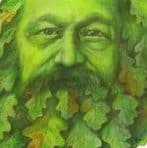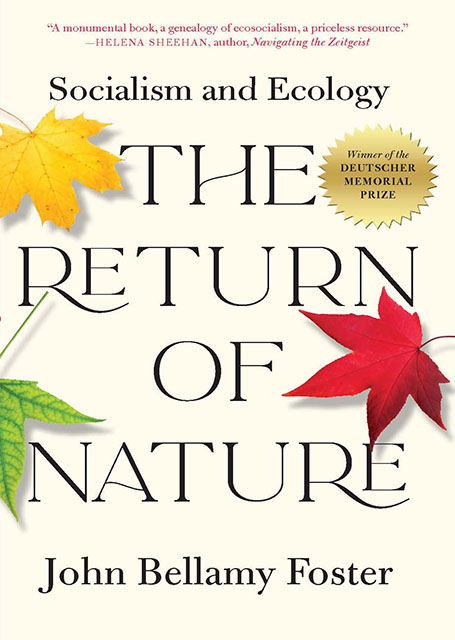The Return of Nature: Socialism and Ecology
by John Bellamy Foster
28$ / 628 pages / 978-1-58367-928-9
Reviewed by Richard Clarke
John Bellamy Foster is perhaps the most prominent of a number of academic-activists who have rescued Marx (and Marxism) from the charge that it is ‘promethean’, inherently ‘productivist’, concerned solely with the forces, relations and modes of production and ignorant or dismissive of environmental matters. Foster’s Marx’s Ecology was published in 2000. It focused on Marx’s writings on capitalist agriculture, soil deterioration, evolutionary theory and the changing relation of humans to nature. Subtitled Materialism and Nature, it showed how nature was central to Marx’s analysis of the processes of capitalism — an analysis that was itself linked to powerful scientific and philosophical developments from Epicurus (the subject of Marx’s own doctoral thesis) through Hegel and Feuerbach to Darwin who, Marx declared, had laid ‘the basis in natural history for our view’.
The Return of Nature starts where Marx’s Ecology left off, with the deaths of Darwin (1882) and Marx (1883). Focused particularly on Britain where they spent most of their lives, and with an extraordinarily wide cast of characters, it brings the narrative closer to the present and the emergence of the radical science and environmental movements of the 1960s and 1970s. Subtitled Socialism and Ecology, it is in effect a genealogy of eco-socialism. It shows how pervasive the ideas of Marx and Engels have been (even when not directly acknowledged) in the parallel development of ecology and of socialist theory and practice. One thread runs from Engels via the inter-war generation of radical scientists and polymaths such as J. D. Bernal, Christopher Caudwell, J. B. S. Haldane, Hyman Levy, Lancelot Hogben and Joseph Needham, and continuing through their post-war successors from Rachel Carson to Barry Commoner, Richard Levins, Richard Lewontin and Stephen Jay Gould, to today’s radical scientists and eco-socialists including Ted Benton and Steven Rose.
Alongside this is an examination of the influence of Marxist ideas in ecological science itself. For this reviewer, much of this second thread has proved a revelation. When I started my ecology degree (actually, botany, zoology and soil science; ‘ecology’ was not yet a discipline in its own right) at the same time as I joined the Communist Party in the late 1960s, Arthur Tansley’s The British Islands and their Vegetation (1939) was a principal reference text. It introduced the word ‘ecosystem’ and it was one of the first studies to analyse plant communities not with reference to static descriptors, but in terms of their interactions and dynamics. Tansley’s earlier (1917) collaboration with other botanists arguing for a more dynamic (dialectical?) approach to the teaching of botany came to be known as the ‘Tansley Manifesto’ and — along with their support to the new National Union of Scientific Workers (later ASTMS and eventually part of Unite) — led to accusations of ‘botanical bolshevism’. Tansley was by no means himself a Marxist and certainly not a communist. But until I read The Return of Nature half a century later, I knew nothing of this or of the way Tansley’s ‘ecosystem approach’ drew so much from Marxist ideas. One of his tutors was the evolutionary biologist (and director of the Natural History Museum in London) Ray Lankester, a friend of the Marx family and one of a handful of people at Marx’s funeral. Others will no doubt find similar revelations.
At 500 pages, together with over 100 pages of notes and references, plus a names and subject index, The Return of Nature is a monumental text, a painstaking and original work of scholarship. It is also a fascinating read and an important work of reference. Most importantly, together with Marx’s Ecology it is politically important. It challenges the dominant narrative of ecology (and of science more generally) as a linear, neutral progression, untainted by social and political influence. It confronts those ‘western’ (academic) Marxist theorists who see dialectics as pertaining only to the interactions between humans and their social and natural environment (the ‘subject–object’ relationship) and not to nature itself. And it shows how central an understanding of ecology must be — and has been — to Marxist theory and practice.


Comments are closed.